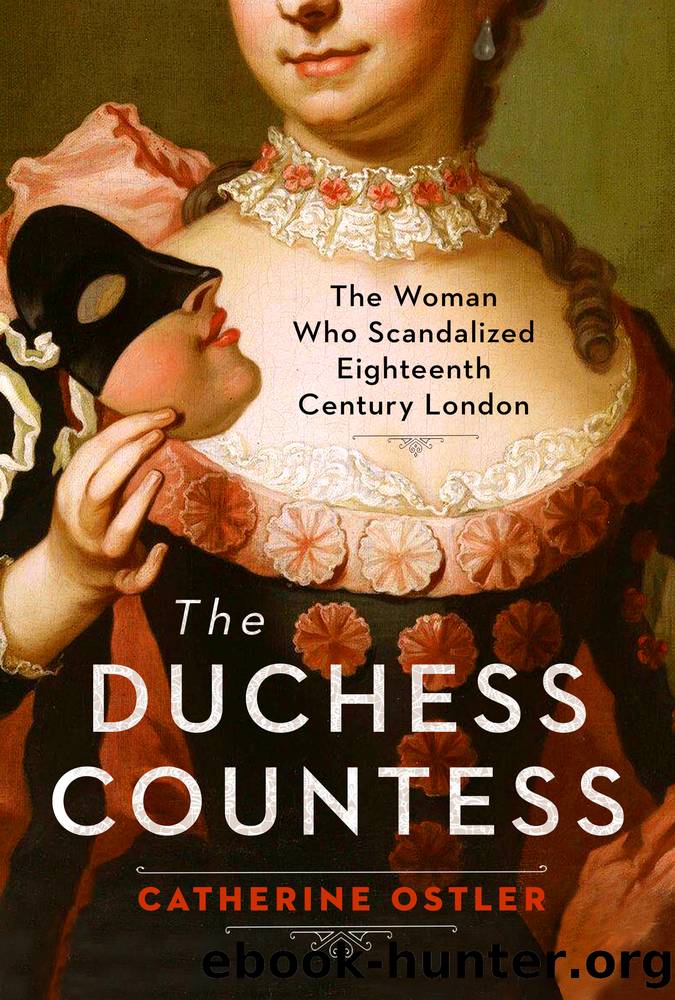The Duchess Countess by Catherine Ostler

Author:Catherine Ostler
Language: eng
Format: epub
Publisher: Atria Books
Published: 2022-02-22T00:00:00+00:00
Perhaps the king, alone among all others, was focusing on the war in America: his reply, if there was one, has not survived, but nothing changed for Elizabeth. A few days later, on December 23, the king issued a royal proclamation closing the American colonies to all commerce and trade, to take effect in March 1776. This was a turning point in the war: until then, the American Congress had been unwilling to accept that King George IIIâas opposed to the current ministryâcould be âseen as the author of our miseries.â Meanwhile, Congress heard that France might support them against Britain.
Elizabethâs physicians did, however, convince the House in person that the trial must be delayed due to her health, because her memory was disordered in consequence of a fit âof a paralytic kind,â and a âdebility of the nervous systemâ11 was impairing her faculties.
A new date was set: January 24. Next it had to be decided where, and how, she would be tried. Lord Mansfieldâs efforts to contain the trial within the privacy of the Lords chamber faltered in the face of those who wanted a public show in Westminster Hall, and the reality of the numbers who had to attend. The Lords were in no mood not to go to trial. The prevailing view was captured by Lord Lyttelton (a rake who had left his wife to go abroad with a barmaid), who found âthe offense of so atrocious a nature as to affect civil society more than many other crimes which carried at first a blacker complexion⦠the line of peerage might be affected if such enormous crimes were suffered to go unexplored.â12 The Lord Chancellor, Lord Bathurst, felt it was âa crime of the blackest dyeâ13 and suggested that only collusion had won the ecclesiastical case.
Elizabeth wrote to Portland of her horror at the prospect of Westminster Hall: âSurely you would not have your friend and the widow of your relation a public spectacle?â14 But the Lords, and the press, were feverish about the trial. A clamoring was underway: they wanted the sport. âThe tide was turned,â wrote Walpole.15 MP George Selwyn commented, âThere is hardly a crime on earth for which she may not be tried⦠there is forgery, and perjuries without end; and a more complete rogue, fool and bitch I take for granted cannot be found in history than are represented by the three dramatis personaeâ16âi.e., Hervey, Kingston, and Elizabeth. The case was moved to Westminster Hall where there was room not only for all the peers, but a large audience, too. The date stalled again: the larger the scale, the more time was needed for the preparations.
The trial was deferred to February 28. The builder responsible for the seating announced it was out of the question; there was no way he could finish the job in less than five weeks. So it was moved again, to April 15. Elizabethâs one-time admirer Lord Hillsborough, who had been a disastrous Secretary of State for the
Download
This site does not store any files on its server. We only index and link to content provided by other sites. Please contact the content providers to delete copyright contents if any and email us, we'll remove relevant links or contents immediately.
| Military | Political |
| Presidents & Heads of State | Religious |
| Rich & Famous | Royalty |
| Social Activists |
Waking Up in Heaven: A True Story of Brokenness, Heaven, and Life Again by McVea Crystal & Tresniowski Alex(37040)
Empire of the Sikhs by Patwant Singh(22207)
We're Going to Need More Wine by Gabrielle Union(18111)
Hans Sturm: A Soldier's Odyssey on the Eastern Front by Gordon Williamson(17038)
Leonardo da Vinci by Walter Isaacson(11955)
The Radium Girls by Kate Moore(10945)
Educated by Tara Westover(7095)
Tools of Titans by Timothy Ferriss(7003)
How to Be a Bawse: A Guide to Conquering Life by Lilly Singh(6725)
The Last Black Unicorn by Tiffany Haddish(5094)
Permanent Record by Edward Snowden(5031)
The Rise and Fall of Senator Joe McCarthy by James Cross Giblin(4859)
Promise Me, Dad by Joe Biden(4478)
The Wind in My Hair by Masih Alinejad(4440)
The Crown by Robert Lacey(4127)
A Higher Loyalty: Truth, Lies, and Leadership by James Comey(4059)
The Iron Duke by The Iron Duke(3665)
Joan of Arc by Mary Gordon(3282)
How to be Champion: My Autobiography by Sarah Millican(3202)
